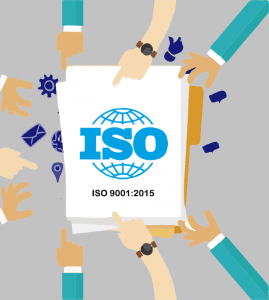ISO 9001 Certification in Nigeria: Driving Quality Excellence
In today’s globalized market, maintaining high-quality standards is essential for businesses to thrive and remain competitive. ISO 9001, the internationally recognized standard for quality management systems (QMS), provides a comprehensive framework for organizations to consistently deliver high-quality products and services. In Nigeria, achieving ISO 9001 certification has become a priority for businesses across various industries, from manufacturing to financial services, as they aim to improve efficiency, gain customer trust, and expand into international markets.
This article explores ISO 9001 certification in Nigeria through four subtopics: its significance, the certification process, industries that benefit, and the advantages of achieving certification.
1. The Significance of ISO 9001 Certification in Nigeria
ISO 9001 certification demonstrates an organization’s commitment to delivering consistent quality, enhancing customer satisfaction, and adhering to globally recognized standards. In Nigeria, this certification is especially critical for several reasons:
- Global Competitiveness: As Nigerian businesses increasingly engage in international trade, ISO 9001 certification helps them meet global quality standards, making them more competitive in export markets.
- Economic Growth: With Nigeria’s growing economy, businesses are under pressure to improve operational efficiency and product quality to remain sustainable.
- Customer Confidence: Certification builds trust among customers by ensuring that products and services meet high standards of quality and reliability.
- Regulatory Compliance: Many industries in Nigeria, such as healthcare and food production, require adherence to strict quality standards, and ISO 9001 provides the framework to meet these requirements.
By aligning their operations with ISO 9001, Nigerian organizations can position themselves as leaders in their respective industries.
2. The Certification Process
Achieving ISO 9001 certification in Nigeria involves a systematic approach that ensures compliance with the standard’s requirements. The process typically includes the following steps:
- Gap Analysis: Assessing the organization’s current quality management practices to identify areas that need improvement to meet ISO 9001 standards.
- Implementation: Developing and implementing a QMS based on ISO 9001 requirements. This includes creating policies, procedures, and documentation tailored to the organization’s operations.
- Internal Audit: Conducting an internal audit to evaluate the effectiveness of the QMS and address any non-conformities.
- Management Review: Reviewing the QMS at the management level to ensure alignment with organizational goals and readiness for certification.
- Certification Audit: Engaging an accredited certification body to perform a two-stage audit:
- Stage 1 Audit: Reviewing documentation and assessing the organization’s readiness for certification.
- Stage 2 Audit: Conducting an in-depth evaluation of the QMS, including site visits, interviews, and operational assessments.
- Certification Award: Upon successful completion of the audit, the organization is awarded ISO 9001 certification.
The certification process requires ongoing commitment, as organizations must undergo periodic surveillance audits to maintain their certification status.
3. Industries That Benefit from ISO 9001 Certification in Nigeria
ISO 9001 certification is beneficial across a wide range of industries in Nigeria, including:
- Manufacturing: Ensuring consistent product quality, reducing waste, and meeting international export requirements.
- Oil and Gas: Enhancing operational efficiency and meeting global safety and quality standards.
- Healthcare: Improving patient care and ensuring compliance with regulatory standards for medical services and equipment.
Conclusion
iso 9001 certification in Nigeria is a powerful enabler for businesses in Nigeria to achieve operational excellence, customer satisfaction, and global competitiveness. By implementing a robust quality management system, organizations can position themselves as leaders in their industries and contribute to the broader economic growth of the country.
Deniel Julian Details
User Profile
- Full name
- Deniel Julian
- Email address
- denieljulian79@gmail.com
- Join Date
- 2025-05-17
- State
- City
- Pincode
- Address
- Follow us on Facebook
- Follow us on Twitter
- Website Name
- Bio

